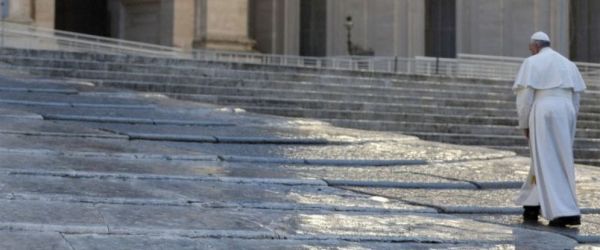The Lord presents himself as the true vine, and speaks of us as branches that cannot live without being united to him. He says: “I am the vine, you are the branches” (v. 5). There is no vine without branches, and vice versa. Branches are not self-sufficient, but depend totally on the vine, which is the source of their existence.
Jesus insists on the verb “to abide”. He repeats it seven times in today’s Gospel reading. Before leaving this world and going to the Father, Jesus wants to reassure his disciples that they can continue to be united with him. He says, “Abide in me, and I in you” (v. 4). This abiding is not a question of abiding passively, of “slumbering” in the Lord, letting oneself be lulled by life: no, it is not this. The abiding in him, the abiding in Jesus that he proposes to us is to abide actively, and also reciprocally. Why? Because the branches can do nothing without the vine, they need sap to grow and to bear fruit; but the vine, too, needs the branches, because fruit does not grow on the tree trunk. It is a reciprocal need, it is a question of a reciprocal abiding so as to bear fruit. We abide in Jesus and Jesus abides in us.
First of all, we need him. The Lord wants to tell us that before the observance of his commandments, before the beatitudes, before works of mercy, it is necessary to be united to him, to abide in him. We cannot be good Christians if we do not abide in Jesus. With him, instead, we can do all things (cf. Phil 4:13). With him we can do all things.
But Jesus needs us too, like the vine with the branches. Perhaps to say this may seem bold to us, and so let us ask ourselves: in what sense does Jesus need us? He needs our witness. The fruit that as branches we must bear, is the witness of our lives as Christians. After Jesus ascended to the Father, it is the task of the disciples — it is our task — to continue to proclaim the Gospel in words and in deeds. And the disciples — we, Jesus’ disciples — do so by bearing witness to his love: the fruit to be borne is love. Attached to Christ, we receive the gifts of the Holy Spirit, and thus we can do good to our neighbour, we can do good to society, to the Church. The tree is known by its fruit. A truly Christian life bears witness to Christ.
And how can we achieve this? Jesus says to us: “If you abide in me, and my words abide in you, ask whatever you will, and it shall be done for you” (v.7). This too is bold: the certainty that what we ask for will be given to us. The fruitfulness of our life depends on prayer. We can ask to think like him, to act like him, to see the world and things with the eyes of Jesus. And in this way, love our brothers and sisters, starting from the poorest and those who suffer most, like he did, loving them with his heart and bringing to the world fruits of goodness, fruits of charity, fruits of peace.
Let us entrust ourselves to the intercession of the Virgin Mary. She always remained completely united to Jesus and bore much fruit. May she help us abide in Christ, in his love, in his word, to bear witness to the Risen Lord in the world.
[Pope Francis, Angelus 2 May 2021]












